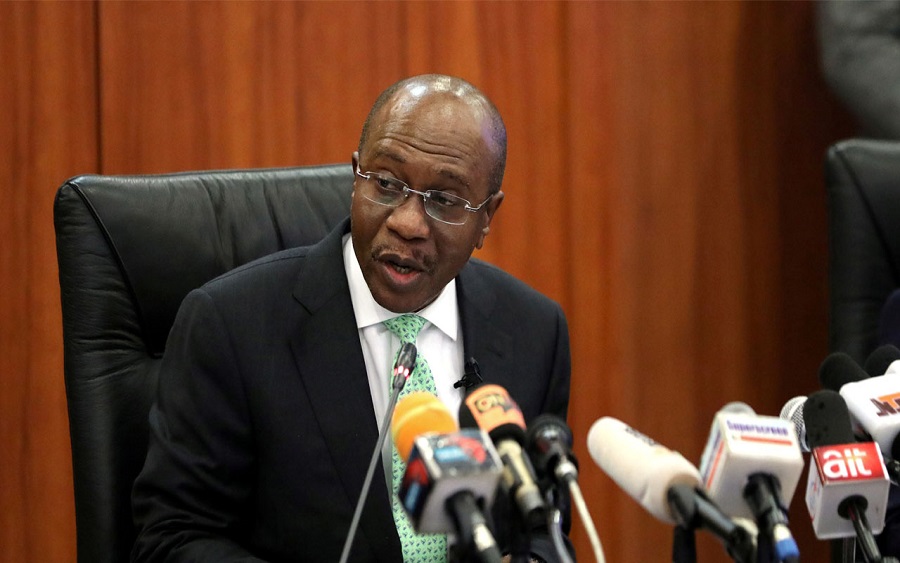Loan beneficiaries under the CBN intervention schemes may not have to pay interest on their facility after all. This is because the apex bank is on the verge of completing paper work on a framework that will discharge them of ther obligation to ay interest on such intervention loans.
Particularly, the Anchor Borrowers’ Programme (ABP) and the Targeted Credit Facility (TCF aimed at providing cushion against Covid 19 pandemic are the more likely to enjoy this interest waiver.
It will also advance over N432 billion through commercial banks to farmers for the 2020 wet season.
Isaac Okorafor, CBN’s director of corporate communications, and his counterpart in the development finance department, told reporters yesterday in Abuja that the CBN governor, Godwin Emefiele, had already directed the development finance department to create the non-interest window, especially for the North-west and North-east.
They spoke to the reporters during an engagement session with rice, maize and cotton farmers as well as private anchors. Okoroafor said the apex bank would soon develop a framework for operation and integration of non-interest banking in all the bank’s programmes, including the ABP.
He noted that the bank was determined to push the economy to ensure Nigeria does not experience consecutive quarters of negative growth.
He added that to refloat the economy, Emefiele had directed the Development Finance Department of the bank and the NIRSAL Micro-Finance Bank (NMFB) to fast-track the approval process of loans, to help restore businesses and livelihoods.
Okoroafor explained that the CBN believed that if the problem of food is addressed, the rising prices, which have continued to fuel inflation, will be curtailed.
He added that the CBN is working to address factors of instability in the economy and is determined to ensure that agriculture is given the impetus required to lift the country out of recession
He said: “The 2020 agricultural wet season is particularly critical to the nation for several reasons. First, there’s been a lot of lull in production because of the lockdown as a result of COVID-19 pandemic.
“Secondly, there has been predictions that the global economy will go into a recession and there had been predictions that the Nigerian economy cannot escape recession.
“At the CBN, we realise that recession is actually knocking on the doors of Nigeria, but it can still be averted or at least reduced since recession is defined as two consecutive quarters of negative growth.
“What it means is that if we are able to stave off a negative growth in one of the quarters, it means we have escaped a recession.
“And the target of the CBN governor and which informs the aggressive nature in which he is trying to ramp up support for agriculture and small-scale businesses, is that we need to aggressively push the economy to avert that recession.
“Aggressive development finance policy is what is required and this is the aim of this wet season programme to ensure that our economy does not slide into recession.”
Similarly, Yusuf said the apex bank had received correspondences from concerned citizens over the need for a non-interest window, particularly for the COVID-19 funds, the ABP and other CBN intervention support schemes.
He said: “We are working on that and in the weeks to come, you will see some policies that we will be rolling out on non-interest facilities. The work had been completed.”
He said the N432 billion financing, which is a loan facility, would be deployed across nine different commodities, such as rice, maize, cotton, oil palm, cowpea, livestock poultry and fish.
He described the 2020 wet season as the largest Anchor Borrower Programme since 2015, adding that over 1.1 million farmers are expected to farm on over a million hectares of land with a projected combined output of 8.32 million metric tonnes for the nine different commodities.
“This is quite significant if you look at what is happening globally, where traditional large producing country like Vietnam and Thailand for rice are closing their silos and closing borders.
“So, we expect to produce every single thing we need to eat, basic things like rice, cassava, cotton and maize locally.
“In 2015 when we took over rice, we have moved the yield for rice; presently we do four metric tonnes per hectare, which used to be between one hectare and 1.5 metric tonnes per hectare. And so you can see the significant leap.
“One very important thing we are also doing this year is the focus on yield to ensure that we incentivise the farmers to go back to the farm.
“I take cotton for instance, traditional yields used to be about 0.3 -0.4 metric tonnes per hectare, but with improved seeds we provided in 2019 and we will be providing in 2020, we have moved that to about two metric tonnes per hectare and so that’s an incentive for farmers.
“Most of the farmers who farmed cotton last year did very well and had enough money to pay their loans and embark on other activities,” he stated.
At the meeting, the Presidents of the Rice Farmers Association of Nigeria (RIFAN), Alhaji Alhaji Aminu Goronyo; National Cotton Association of Nigeria (NACOTAN), Mr. Anibe Achimugu; Maize Association of Nigeria (MAAN), Alhaji Bello Abubakar, and the Maize Growers, Processors, and Marketers Association of Nigeria (MAGPMAN), Dr. Edwin Uche, attested to the success of the ABP, which they noted has enhanced the value chains of their respective commodities.
While pledging their support to the continued implementation of the ABP to generate employment and create wealth, they promised to ensure that the loans collected by farmers are promptly recovered in order to sustain the programme.









